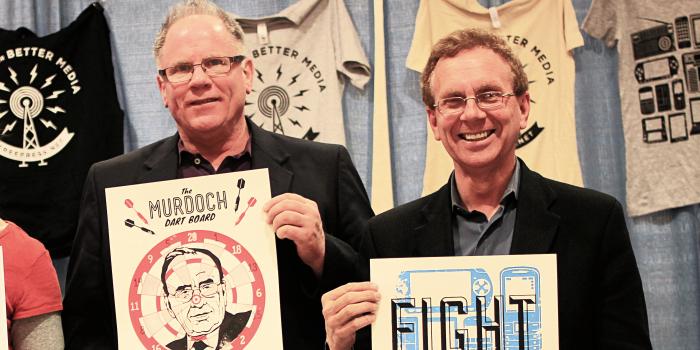Free Press Action Concerned That Journalism-Recovery Package Favors Large Conglomerates, Won't Help Reporters Who Need it Most

WASHINGTON — The HEROES Act released by House Democratic leadership on Tuesday contains measures to extend the federal Paycheck Protection Program to chain-owned TV and radio stations, as well as chain-owned newspapers. Under the plan, most local outlets owned by these conglomerates would individually qualify as small businesses, even if they’re owned by firms that were too large to qualify for funding under the original program.
While Free Press Action strongly supports including journalists in the next recovery package, it has serious concerns about the details of the House approach. On Monday, Free Press Action released What a Journalism-Recovery Package Should Look Like During the COVID-19 Crisis, a paper proposing a series of journalism-relief policies, including billions of dollars in direct and indirect subsidies to reporters as well as increases in federal support for public-media institutions that would protect a significant number of local newsroom jobs.
Free Press Action Co-CEO Craig Aaron made the following statement:
“I’m encouraged that Congress recognizes that journalists are essential workers during this crisis. Local newsrooms across the country are in danger of going under, and this bill could help some reporters stay on the job to cover communities that need trustworthy and lifesaving information. But I’m also worried that, as written, this legislation would benefit the biggest chains at the expense of their smaller competitors and other struggling businesses.
“The good news is that Congress sees that we need policies to sustain quality local journalism and keep communities informed. Measures designed to maintain payroll and keep reporters on the beat are needed. And the legislation released today does focus on support for those doing local newsgathering and providing emergency information. Requirements that the funds be spent at the local level are important, as is strict oversight.”
“However, the HEROES Act fails to appropriate more funds earmarked specifically for journalism. That means TV and radio stations and publicly traded media companies will be competing for loans directly with their locally owned competitors and every other small business, when many of these large companies should have access to other funds. Congress shouldn’t let Sinclair become the next Shake Shack.
“The inclusion of the affiliates of the largest broadcast conglomerates is a major concern. Unlike local newspapers and other digital-journalism outlets, TV stations have numerous robust revenue streams to make up for lost commercial advertising, including retransmission fees and a looming windfall of 2020 election advertising. That’s what they’re touting on their own investor calls. Their relatively healthy financial status should disqualify the largest chains from this program.
“Including the largest chains in this program is even harder to swallow because these same companies have for years argued for more consolidation and concentration, claiming that supersizing their companies was the only way to compete in the market. Now that their lies have been exposed, maybe we can finally admit that consolidation was never the magic elixir they promised.
“Their massive mergers were approved based on promises of jobs and other alleged benefits to local communities. During those more stable times, these same companies gutted their newsrooms to maintain fat profit margins. Now that there’s a crisis, suddenly they all want to be counted as separate, independent entities. You can’t have it both ways.
“Here’s what could work: Appropriating more emergency stabilization money alongside the PPP program that’s specifically targeted at newsroom jobs, so we’re helping reporters without starving other businesses. Tax credits for companies that can demonstrate that they’re willing to invest in newsgathering. Stricter limits that ensure the affiliates applying don’t have access to more funds from their corporate owners or other lenders. And stronger oversight to be sure these funds truly are getting to newsrooms. Then we should talk about returning these stations and newspapers to local hands, where they so clearly belong.”




